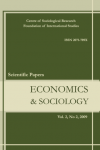THE CENTRAL BANKING SYSTEM
PARADOX
THE CENTRAL BANKING SYSTEM
PARADOX
Author(s): Víctor I. Espinosa, Miguel Angel Alonso-Neira, Jesús Huerta de SotoSubject(s): National Economy, Business Economy / Management, Financial Markets, Business Ethics
Published by: Fundacja Centrum Badań Socjologicznych
Keywords: interest rate; central bank; inflation; business cycle; 100 percent reserve requirements; banking ethics;
Summary/Abstract: The conventions of monetary theory assumethe central banking system (CBS) as the starting point forachieving the stability and efficiency of the financialsystem. This paper stresses the stability-efficiency thesisbased on the Austrian business cycle theory (ABCT). Itargues that the stability-efficiency thesis under CBS poses aparadox for two main reasons. First, central banks' interestrate handling causes business cycles, yielding theintertemporal discoordination of the money and goodsmarkets. Second, a central bank's lender-of-last-resort roleis an incentive to call for further interest rate handling,making the chance of smooth business cycles difficult orimpossible. This paradox is empirically analyzed anddiscussed through the True Money Supply (TMS)performance in the United States's business cycle phasesbetween 1975 and 2022. Consistent with the ABCT, theresearch results unlock the paradox by showing that CBScauses business cycles. Some policy implications areoutlined for further research and revision of monetarytheory.
Journal: Economics and Sociology
- Issue Year: 16/2023
- Issue No: 4
- Page Range: 56-72
- Page Count: 17
- Language: English

